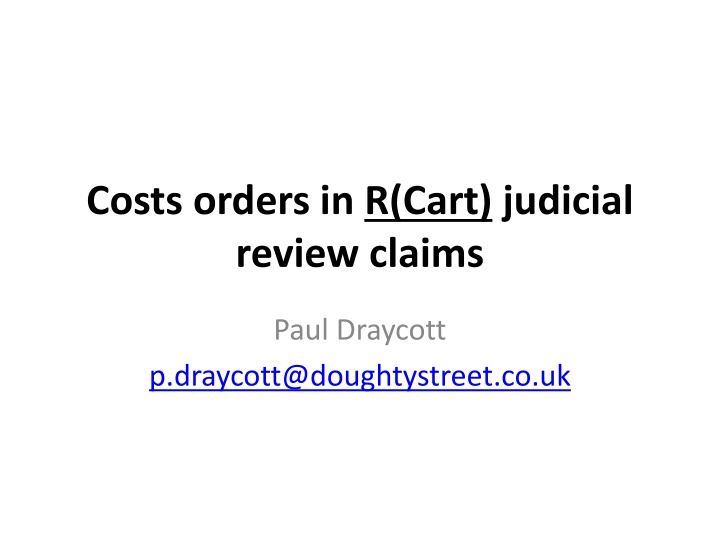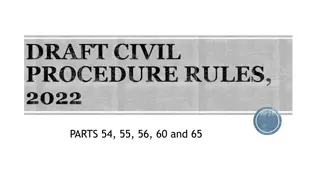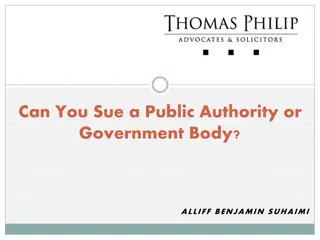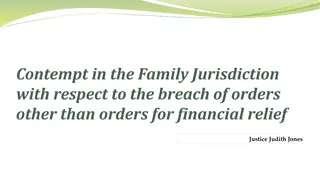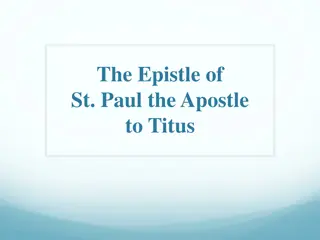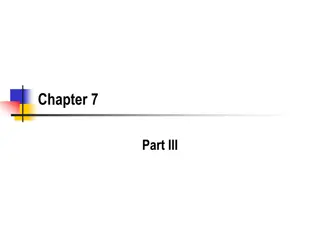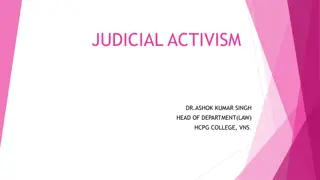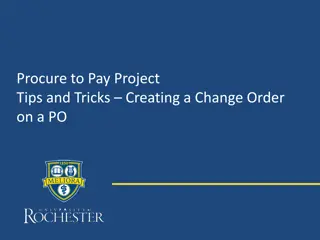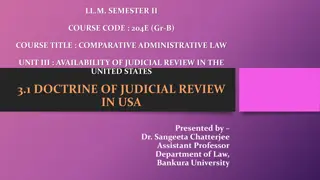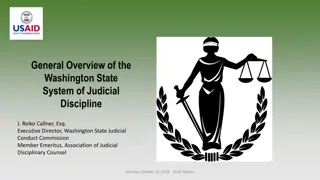Costs Orders in R (Cart) Judicial Review Claims by Paul Draycott
CPR 54.7A allows Claimants to challenge Upper Tribunal decisions via judicial review when permission to appeal is refused. The case of R(Jawad Faqiri) sheds light on cost orders against interested parties and the UT. Despite controversy, the Court of Appeal upheld the costs order made by the Admin Court.
Download Presentation

Please find below an Image/Link to download the presentation.
The content on the website is provided AS IS for your information and personal use only. It may not be sold, licensed, or shared on other websites without obtaining consent from the author.If you encounter any issues during the download, it is possible that the publisher has removed the file from their server.
You are allowed to download the files provided on this website for personal or commercial use, subject to the condition that they are used lawfully. All files are the property of their respective owners.
The content on the website is provided AS IS for your information and personal use only. It may not be sold, licensed, or shared on other websites without obtaining consent from the author.
E N D
Presentation Transcript
Costs orders in R(Cart) judicial review claims Paul Draycott p.draycott@doughtystreet.co.uk
CPR 54.7A Following R(Cart) -v- Upper Tribunal (2012) 1 AC 663 SC CPR 54.7A provides Claimants with the opportunity to challenge by judicial review a decision by the Upper Tribunal ( the UT ) to refuse them permission to appeal ( PTA ) from an adverse determination of the First Tier Tribunal ( the FTT ). Permission for a claim will only be granted by the Admin Court if the second appeals test is met, namely the raising of an important point of principle or practice or a compelling reason for the claim to be heard. If permission is granted, the UT s refusal of permission will be quashed on the papers without a hearing, unless the UT or the interested party requests a full hearing within 14 days. Notably, CPR 54.7A is silent as to the issue of costs.
R(Jawad Faqiri) -v- Upper Tribunal (Immigration and Asylum Chamber) In R(Faqiri) (2019) 1 WLR 4497 CA the legally aided Claimant, who had unsuccessfully appealed to the FTT on asylum and human rights grounds, succeeded in quashing the UT s refusal of PTA, but the UT (as is customary) played no part in the judicial review proceedings, and the Secretary of State for the Home Department ( the SSHD ), the interested party, opposed costs on the basis that they had not lodged an acknowledgment of service ( AoS ). The SSHD s practice was instead to lodge a pro-forma letter with the Court stating in this case my instructions are not to lodge an AoS this is because the law in this area is settled by the case of R(Cart) if the Court takes the view that it would be assisted by a detailed response I therefore reserve the right to lodge (one) at a future date . By reason of the SSHD s lack of involvement in R(Faqiri), the Admin Court made no order for costs save for remitting the issue of the costs of the proceedings to the UT for determination as part of the Claimant s statutory appeal. The Claimant appealed to the Court of Appeal.
R(Jawad Faqiri) -v- Upper Tribunal (Immigration and Asylum Chamber) At [34]-[39] the CA held that no costs order could be made against the UT as the criteria within R(Davies) -v- Birmingham Deputy Coroner had not been made out. At [49]-[54] the CA accepted that a costs order could be made against an interested party who had intentionally played no part in the proceedings, particularly as the real protagonists within the claim were the Claimant and the SSHD, who had made the original decision refusing the Claimant s application for international protection and therefore precipitated the subsequent judicial review claim, not least because they continued to oppose the Claimant s underlying claim to refugee status.
R(Jawad Faqiri) -v- Upper Tribunal (Immigration and Asylum Chamber) However controversially, the CA then upheld at [55]-[57] the Admin Court s costs order as it fell well within the legitimate scope of lawful costs order open to (the Court) . In so doing, the CA recognised that the effect of the said order was to effectively deny the successful Claimant his costs, unless he could establish before the UT or FTT that the SSHD had acted improperly for the purposes of Rule 10 of the Tribunal Procedure (Upper Tribunal) Rules 2008. The CA was also influenced at [55] by (i) both parties conceding that the remittal of the issue of costs to the UT was jurisdictionally open to the Admin Court; and (ii) that the Claimant s protection and human rights appeal had ultimately been lawfully dismissed by the FTT following its remittal, meaning that his overall claim failed.
R(JH(Palestinian Territories)) -v- (1) the UT (IAC) (2) SSHD In R(JH), which is presently listed to be heard on 24 June 2020, the CA will re-consider R(Faqiri) and it is hoped will provide guidance as to what the usual costs order should be in a R(Cart) judicial review claim. The present case differs from R(Faqiri) procedurally in that (i) the Claimant was only granted permission for his claim after incurring the additional costs involved in a successful appeal to the CA; and (ii) his remitted appeal was largely successful before the UT, after the SSHD withdrew their appeal against the FTT s decision to allow his appeal on humanitarian protection grounds.
Legally assisted claimants Since [65] of R(Bahta) and others [2011] C.P. Rep 43 CA, which established a heavy burden upon a Defendant to show why they should not pay a successful Claimant s costs, there have been significant cuts in legal aid for public law claims. On 3 October 2011, the Community Legal Service (Funding)(Amendment No.2) Order 2011 made a 10% cut to all hourly rates before the higher courts. On 2 December 2013, Schedule 1 of the Civil Legal Aid (Remuneration)(Amendment) Regulations 2013 made further reductions included reducing by 50% the hourly rate for counsel over 10 years call who are outside London for Admin Court and UT judicial review. Section 41(1)-(3) of the Legal Aid Sentencing and Punishment of Offenders Act 2012 also generally places the payment of legal aid for judicial review claims at risk in the absence of the Court or Tribunal granting the Claimant permission or else the claim meeting certain narrow criteria which concern the Defendant deciding to withdraw the decision under challenge or the Court or UT ordering a rolled up hearing.
Legally assisted claimants It is hoped that the CA in R(JH) will further adopt and extend the proposition accepted at [92]-[93],[106] of ZN(Afghanistan) (2018) 3 Costs LO 357 CA that the imperative of ensuring the future availability of legal aid practitioners is an important factor as to why costs should be awarded for claims that are successful for reasons encompassed within their grounds. Further, pursuant to [69] of R(Ben Hoare Bell Solicitors) -v- Lord Chancellor (2015) 1 WLR 4175 CA which noted with concern the 23% decline in applications for legal aid since the said cuts and the need for a review of the same, in R(JH) the CA will be asked to consider the Ministry of Justice Statistics Quarterlies which confirm the steady fall in judicial review claims being commenced from 2014-2019.
Legally assisted claimants The MOJ s Civil Justice Statistics Quarterlies confirm : July to September 2014 : although in 2013, 13,130 claims were commenced, during the period from January to September 2014, only 3,059 were issued, although some of the shortfall would instead have been issued in the UT; July to September 2018 : during the period from January to September 2018 only 2,700 claims were issued, with immigration and asylum claims being down 21% and civil claims down 10% in comparison with the previous year; July to September 2019 : during the period from January to September 2019 only 2,600 claims were issued, with immigration and asylum claims being down 5% and civil claims down 2% in comparison with the previous year;
Should the Interested partys failure to lodge an AoS have cost consequences? Under CPR 1.1 and 1.3 a party has the obligation to help the court and further the overriding objective, which requires that they comply with CPR rules and assist with dealing with a case at a proportionate cost. If a party acts in breach of CPR 1.1, this can be taken into account when considering costs as per 1400H and 1403D of Ford -v- G.K.R Construction Ltd (2000) 1 WLR 1397 CA, [12] of Hallam Estates Ltd and another -v- Baker (2014) 4 Costs LR 660 CA and [20]-[24] of Davies -v- Forrett and others [2015] EWHC 1761 (QB). A party also has a duty to lodge an AoS under CPR 54.8(1),(2). If a party fails to lodge an AoS but takes part in a substantive hearing of a claim, this will have costs consequences under CPR 54.9(2) as per [11]-[12] of R(Kalah) -v- SSHD [2017] EWHC 2373.
Can the Admin Court lawfully remit the issue of costs to the UT? Rule 10(3),(6) of the Tribunal Procedure (Upper Tribunal) Rules 2008 restricts the award of costs to a party unless the party or their representative has acted unreasonably in bringing, defending or conducting the proceedings. At [33] of Thapa & Others (costs : general principles; s.9 review) [2018] UKUT 00054 (IAC) the UT held that the said costs powers are to be exercised with significant restraint and are of a fundamental different character from those under the CPR where costs will regularly follow the event.
Can the Admin Court lawfully remit the issue of costs to the UT? Section 29 of the Tribunals, Courts and Enforcement Act 2007 is entitled costs and expenses and provides in respect of the FTT s and UT s costs jurisdiction : (1) The costs of and incidental to (a) all proceedings in the (FTT), and (b) all proceedings in the (UT) shall be in the discretion of the Tribunal in which the proceedings take place . Section 29 closely follows the wording of section 51 of the Senior Courts Act 1981, in respect of which it is established that an appeal is a separate proceeding from a trial, as per [42]-[47] of Hawksford Trustees Jersey Ltd -v- Stella Global UK Ltd (2012) 1 WLR 3581 CA and [18] of Plevin -v- Paragon Personal Finance Ltd (No.2) (2017) 1 WLR 1249 SC.
